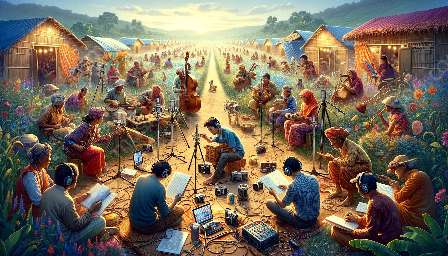Music has always been a powerful medium for expressing cultural identity, defining boundaries, and bridging divides between different communities. This article explores the multifaceted role of music in the construction and negotiation of cultural boundaries, drawing on the perspectives of ethnomusicology and sound studies.
Defining Cultural Boundaries through Music
Music is deeply intertwined with cultural identity and serves as a means to delineate boundaries between different societies, ethnic groups, and nations. Through distinct musical styles, instruments, and vocal traditions, communities establish a sense of belonging and separation from others. For example, the traditional music of a particular ethnic group may convey unique cultural values, historical narratives, and social norms, helping to demarcate the boundaries of that community.
Moreover, music often reflects and reinforces societal power dynamics, highlighting the influence of dominant cultures in defining and perpetuating boundaries. This can be observed in the historical appropriation of music from marginalized communities by dominant groups, leading to the reinforcement of cultural hierarchies and the imposition of boundaries between the privileged and the marginalized.
Bridging Cultural Divides through Music
Despite its role in demarcating cultural boundaries, music has also been a powerful force for bridging divides and fostering intercultural exchange. Through the fusion of musical elements from different traditions, genres, and regions, artists and composers create new, hybrid forms of music that challenge and transcend cultural boundaries. This musical cross-pollination not only enriches artistic expression but also promotes understanding and empathy between diverse cultural communities.
Furthermore, music has been instrumental in shaping transnational and global connections, transcending geographical, linguistic, and political boundaries. In an increasingly interconnected world, music serves as a universal language that brings people together, enabling the exchange of ideas, experiences, and emotions across cultural frontiers.
The Study of Music and Cultural Boundaries: Ethnomusicology and Sound Studies
Ethnomusicology, as an interdisciplinary field, offers valuable insights into how music intersects with cultural boundaries and serves as a lens through which to analyze the dynamic relationship between music and society. By examining musical practices, performance contexts, and the social meanings of music within specific cultural settings, ethnomusicologists shed light on the ways in which music both reflects and challenges cultural boundaries and norms.
Sound studies, on the other hand, delves into the broader sonic manifestations of cultural boundaries, extending beyond music to encompass the sonic landscapes of everyday life. This interdisciplinary field investigates the role of sound in shaping and contesting cultural boundaries, encompassing diverse sonic phenomena such as language, noise, silence, and environmental sounds. Through sound studies, scholars explore how sonic experiences contribute to the construction and negotiation of cultural boundaries, offering a holistic understanding of the role of sound in shaping human societies.
Conclusion
Music, as a dynamic and multifaceted form of human expression, occupies a central position in the construction and negotiation of cultural boundaries. While it holds the power to demarcate and reinforce boundaries between different cultural groups, music also serves as a bridge for cross-cultural dialogue, mutual understanding, and solidarity. Through the lenses of ethnomusicology and sound studies, scholars and enthusiasts continue to unravel the intricate ways in which music intersects with cultural boundaries, enriching our understanding of the diverse and interconnected musical landscapes of the world.



































